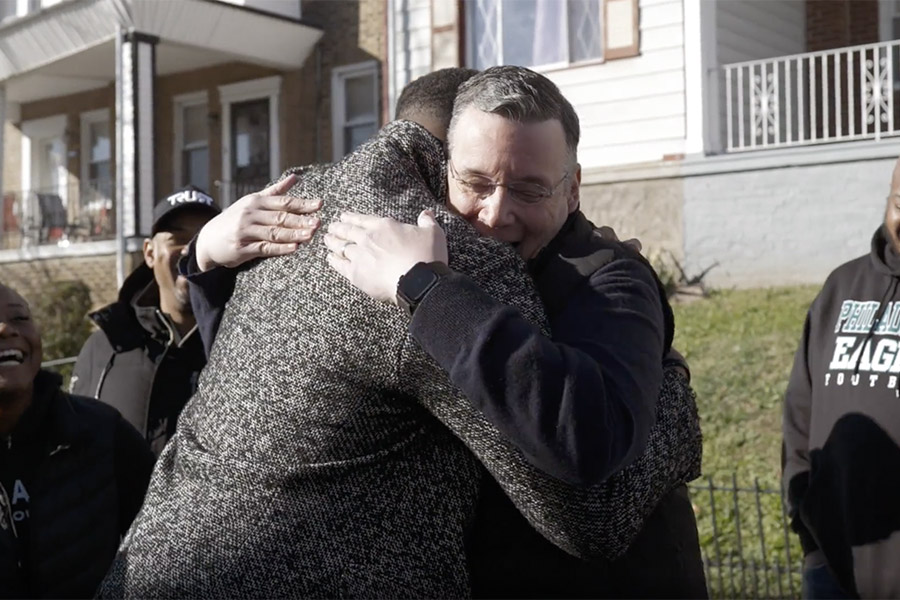The Problem With Jeff Brown’s Racial Code-Switching
The candidate was recently recorded telling a white voter that his opponents would be "lynched" if people knew about their corruption. It's another example of him seeming to speak differently — and to promote different policies — to Black people and white people.

Jeff Brown as he appeared in an early campaign ad.
The most disappointing aspect of high-profile election cycles is that they reveal troublesome qualities of people you didn’t previously take major issue with.
I’ve never been able to look at President Joe Biden the same way after he described then-candidate Barack Obama during the 2007 Democratic presidential primary as “the first mainstream African-American who is articulate and bright and clean and a nice-looking guy.” I still cringe when I think about how the Hillary Clinton campaign thought it was okay to pitch her as an “abuela” to Latinx voters during the 2016 presidential election. I still can’t take Mayor Jim Kenney seriously after he made the claim during his 2019 re-election campaign that the lack of diversity in the city’s top jobs was due to Black applicants being “super-talented and too overqualified.”
The candidate in the current mayoral election cycle who has me most concerned is ShopRite proprietor Jeff Brown. The man who has been praised for working in Black communities appears to have a problem on the issue of race. Throughout his campaign, we’ve seen a series of missteps that have led me to question his sincerity. As a Black voter, I believe Brown suffers from racial code-switching — changing how you talk based on who you’re talking to — on matters that impact people who look like me, and that’s a recipe for disaster for any white man who plans to lead a city whose population is majority Black and brown.
Last week, I received a video someone had recorded of Brown speaking candidly with a white man about his opponents while at a Philadelphia Crosstown Coalition candidates’ forum at Penn. How he chose to speak on them instantly triggered me.
@JeffBrownGrocer, can you explain what you meant when you stated that the citizens would "lynch" your mostly Black and brown opponents you referred to as "insiders" and yourself as an "outsider"?
I just haven't heard anyone in years refer to people being lynched like this. pic.twitter.com/e8Fh4efEOZ
— Ernest Owens (@MrErnestOwens) March 31, 2023
“A lot of the insiders, they don’t want an outsider,” Brown said to the white man in the video. “Because all the things they do, to me, some of them are horrifying, that they have their little deal amongst themselves, and if the citizens knew, they’d lynch them.”
In 2023, a white Philadelphia mayoral candidate casually and cavalierly invoked lynching when discussing his mostly Black and brown mayoral opponents. If that doesn’t concern you at all, I don’t know what will.
The history of lynching in America is as old as white supremacy itself. Brown’s use of the metaphor so confidently and casually to another white man in public is utterly disturbing. I doubt that any person of color would have uttered that word so nonchalantly.
In an apologetic statement to the Philadelphia Inquirer, Brown said the problematic term “is hurtful to so many and has no place in public discourse.”
“I think my record speaks for itself, and even though there was no racial intent, I understand that my words were offensive,” he added. “I promise to do better in the future.”
I’d argue that the term has no place in public or private discourse. If Brown’s record truly speaks for itself, then this is now part of his record. That’s the point of a public campaign: to vet candidates and see how they perform with the world watching.
For example, Brown, the man who once said that “people of color, especially Black people, have been my life’s work” at a Black business/DiverseForce candidates forum, is the same guy who confidently dropped a metaphor about lynching in front of a white voter at another candidates’ forum. Brown, the man who in January told Black voters in West Philly that “we have enough money in the police budget” is the same guy who later that month in a largely white neighborhood in the Northeast said that “it’s the No. 1 priority right now” when asked if “more police and more money for police” was a priority.
His flip-flopping in the Northeast also included him bashing District Attorney Larry Krasner as being “against the police officers” and declaring that he “would look to repeal” the city’s landmark Driving Equality law. (Brown would later recant his remarks on repealing the legislation.) This was yet another bait-and-switch from a man who can’t seem to stop putting his foot in his mouth — which makes one wonder when this “future” in which Brown will actually “do better” is going to arrive.
For a candidate with no prior elected experience who is running for the city’s top job to think that he can appeal to Black and white voters with different sets of policies, values, tones and tenors is dangerous. Candidates should stand by one consistent platform before all voters, regardless of race.
These actions are now a part of Brown’s “record” — and for him not to recognize that both deeds and words matter reveals that he doesn’t understand a big part of the mayoral job description. Just as there’s power in one’s work, there’s also unfathomable power in how a leader uses words. A person who doesn’t understand this will never be fit to lead.


